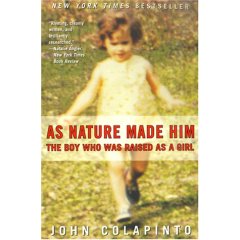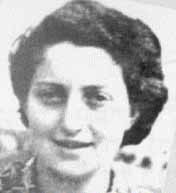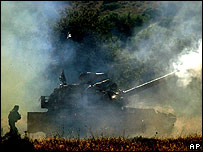Intersex is here to stay
 Excellent article in the New York Times this week about the current state of medicine and activism concerning intersex children.
Excellent article in the New York Times this week about the current state of medicine and activism concerning intersex children.
Short version: doctors and parents have been terrified for decades (I suppose longer) that intersexed children -- children born with genitalia that do not conform neatly to one or the other of our two acknowledged genders -- would be permanently scarred if left to grow up whole, as they were born. I do not use the word "terrified" lightly.
These children were and are subject to multiple surgeries without their consent, lied to about their bodies and their memories, and assigned genders which sometimes do not fit their gender identities. It was and is a person-made and completely unnecessary tragedy. I pray it will be ended in my lifetime.
A couple of quotes that stand out:
1.
When I met Melvin Grumbach, one of the doctors who cared for Chase as an infant and who went on to become one of the most respected pediatric endocrinologists in the country, he’d clearly heard Chase’s line of reasoning many times. He participated in forming the consensus, and he also signed it. He knew what he was supposed to say. “We say, ‘Don’t do surgery unless it’s necessary, unless it’s important,’ ” he told me in early summer in his office at the University of California in San Francisco, where he’s now an emeritus professor. “But I think if the external genitals are really masculinized, you work it out with the family. I mean, good grief. What about the parents? The parents are raising the child. Don’t they have some say?”
I love the The Intersex Society of North America's (ISNA) simple and stark take on this: "Parents’ distress must not be treated by surgery on the child."
Especially in the light of:
2.
(Eric) Vilain has a clinic devoted to treating disorders of sex development, where he sees 40 to 50 new intersex patients a year. When he first left the lab and started seeing patients, he said he couldn’t believe that surgeons were performing genital reconstructions with so little data. “To me it was shocking, because where I come from, molecular genetics, we’re under extreme scrutiny,” Vilain told me on the phone in July. “If you want to show that a molecule causes something, you have to show it with a bunch of excruciatingly painful controls. And here I was looking at a lot of surgeons who were saying, ‘We think it’s good to do genital surgery early on because the children are doing better.’ So each time I would ask, ‘What’s the evidence that they’re doing better?’ And in fact the answer is there’s no real evidence. Then I’d ask: ‘What does it mean doing better? How do you measure it? Are you talking quality of life, or quality of sex life?’ And there was never any convincing answer.”
And for me, this is what it comes down to:
3.
Building on work on the Colombia case, in 2004, Chase and the Intersex Society were involved in persuading the San Francisco Human Rights Commission to hold a hearing and address the question of medical procedures on intersex infants in the United States. Over the course of three hours, dozens of intersex people and parents of intersex people testified. When it came time to ratify the report, Chase addressed the commission. “What the Human Rights Commission has done. . .is to recognize me as a human being,” she said. “You’ve stated. . .that just because I was born looking in a way that bothered other people doesn’t mean that I should be excluded from human rights protections that are afforded to other people.”
In the end, intersexuality is like being gay: the problem is that it bothers other people.
Those imagined scenes of children being taunted in a locker room that drove doctors and parents to unnecessary surgery...when will it become our first thought to educate the other children, instead of mutilating the one that stands out?
---------------------------
More resources:
The Intersex Society of North America (ISNA)
Their main points:
* Intersexuality is primarily a problem of stigma and trauma, not gender.
* Parents’ distress must not be treated by surgery on the child.
* Professional mental health care is essential.
* Honest, complete disclosure is good medicine.
* All children should be assigned as boy or girl, without early surgery.
And here is a great list of books. I have read One of Us by Alice Dreger and really enjoyed it. I also plan to read As Nature Made Him by John Colapinto.
--------------
On a slighly different and unexpected hand...I found myself stunned by the first line of this same article, not because of the reaction described therein to an intersexed child, but because of the treatment of her mother:
When Brian Sullivan — the baby who would before age 2 become Bonnie Sullivan and 36 years later become Cheryl Chase — was born in New Jersey on Aug. 14, 1956, doctors kept his mother, a Catholic housewife, sedated for three days until they could decide what to tell her. Sullivan was born with ambiguous genitals...
(bolding mine.)
The arrogance of that system floors me. The doctors' extreme reaction to a baby not conforming to gender roles - this, at least, I am used to. This is why Cheryl Chase and people like her are so important: we are making a difference so that gender lines can be blurrier and no one has to be mutilated or die for their gender identity or physical appearance.
But the wanton drugging of a healthy woman, to shield her from the truth of her baby's healthy body...
I understand that it was the 1950s. Perhaps this woman was so programmed by a repressive society that her reaction upon hearing about her child's intersexuality would have been so extreme as to justify her involuntary 3-day coma.
But I gravely doubt that. It was surely the doctors who had been programmed to believe that a woman had no right to a say in her own access to consciousness.
We have not reached a sane or just society. But an image like this unexpectedly hits me in the chest with a reminder that we have come some distance.

